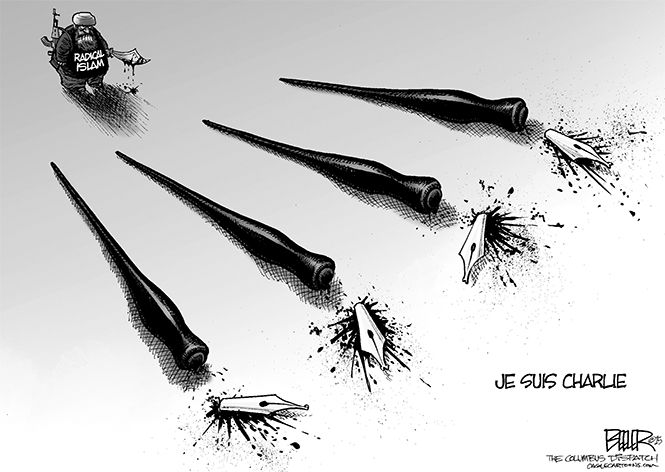Our View: Respecting expression after tragedy
January 11, 2015
As student journalists at Kent State, we know how fortunate we are to have the freedom to report, express our opinions and tell stories that matter; that affect the Kent State community; and that sometimes reveal issues affecting our world.
During winter break, while most students were enjoying their time off, away from the hustle and bustle that was fall semester’s finals week, a French satirical newspaper, Charlie Hebdo, was attacked. While writers and cartoonists are often subjected to criticism, the editorial cartoonists of Charlie Hebdo were murdered for their depictions of the Prophet Muhammad. Two men believed to be linked to a radical Islamic group walked into the offices of the newspaper and shot 12 people dead.
The cartoons, the work of satire, could be taken as offensive. And that was the point. Satire is defined as the use of humor, irony and often exaggerated ridicule to bring certain characteristics of events or individuals to light — to expose the world to deeper issues in society.
While students might voice their thoughts in response to offensive comments left on Facebook pages, gasp at rude gestures displayed in Instagram feeds or outright express their opinions on Twitter, the thought that violence could result from that expression is often nonexistent. With our freedoms of speech and expression in the U.S., hardly do we think of possible consequence to our actions. Words escape our fingertips through our smartphone screens and computer keys often quicker than we can even process the thought.
As the semester begins, we encourage students to expand their world views, to think about and even study different religions in order to understand, and also to respect those differences. Kent State has a diverse student body. Instead of judging others or taking a radical stance, we believe students should take the time to learn from your fellow students and professors. And remember, your opinions are protected, but not always respected.
The above editorial is the consensus opinion of the The Kent Stater editorial board, whose names are listed above.












